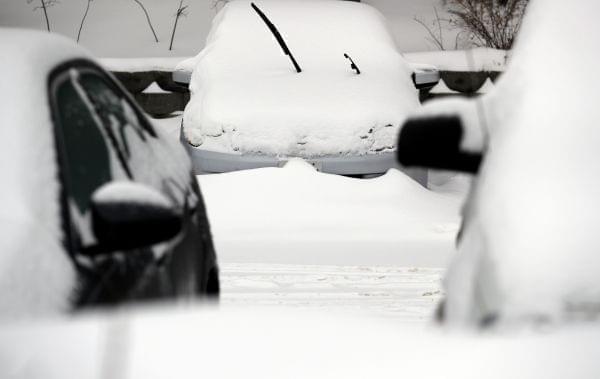Preparing For Cold Weather; Juvenile Life Sentences; Mosque Bombing Pleas; Antibiotic Overuse

(AP Photo/Nam Y. Huh)
On The 21st: Illinois is facing sub-zero temperatures for the next couple of days. How do administrators decide whether or not to close school? Plus, the Illinois Supreme Court is hearing a case today that asks: how long is too long when it comes to sentencing juvenile offenders? Also, two men from central Illinois pleaded guilty in Minnesota federal court last week for trying to bomb a mosque in August of 2017. And, a new study shows more than 80 percent of the time we’re prescribed antibiotics we don’t actually need it.
Many schools across the state have already closed due to cold weather. The University of Illinois has canceled classes starting tonight and through tomorrow. And, some of our K-12 schools are closed as well.
And when it comes to K through 12 schools, superintendents are the ones making that difficult decision. Whether or not school is closed has a huge impact on students, parents, and teachers. So how do superintendents make that call?
Carl Johnson, Superintendent of the Colona School District (which is near the Quad Cities) joined us on the line.
The temperatures tonight and tomorrow are not to be taken lightly.
Whether it’s the transit system- many towns are offering warming buses at busy transit sites, so people are not waiting outside in bus shelters - or schools, lots of people are coping with this extreme weather.
Governor Pritzker has put an emergency preparedness plan into place and other organizations around Illinois are taking precautions.
The Illinois Emergency Management Agency has identified a list of warming centers across our state where people can take refuge from the outdoors.
One of those warming centers is Carpenter’s Place in Rockford. Executive Director Kay Larrick joined us on the line. Also joining us on the line was Matt Burgess. Matt is with Home Sweet Home Ministries in Bloomington.
If you live near Rockford and need a warm place this week, @CPbringsHope is open!
— The 21st (@21stShow) January 29, 2019
Near Bloomington, @hshministries is also open and has warm clothes for people, as well.
Plus-
You’ve heard the term: life in prison. And here in Illinois it’s something that only adults can be sentenced to.
But what does a life sentence mean if you’re a teenager? Is 40 years a life sentence? What about 50?
That’s a question up before the Illinois Supreme Court in the case People v. Buffer. Buffer is Dimitri Buffer, who was 16 years old when he shot into a car, thinking it belonged to a rival gang member. Instead, it killed a 25-year-old woman. His sentence schedules his release for when he’s 66 years old.
Joining us we had Dimitri Buffer’s attorney, Assistant Appellate Defender Chris Gehrke.
Treating juveniles the same as adults may not give adequate weight between the differences between youths and adults," explains @Prof_Amar @UIllinoisLaw, especially when you consider what is "cruel and unusual."
— The 21st (@21stShow) January 29, 2019
Emily Horner also spoke with us on the line from Chicago, where she’s a reporter with Injustice Watch. And in studio we had Vikram Amar, Dean of the University of Illinois College of Law.
And-
Two central Illinois men have pleaded guilty in Minnesota federal court to bombing the Dar Al Farooq Islamic Center in Bloomington, Minnesota in August of 2017.
Michael McWhorter and Joe Morris were two of three Clarence, Illinois men accused of bombing the mosque. The third man, Michael Hari, is also charged, but he is still in jail facing additional charges.
Joining us from St. Paul we had Matt Sepic, he’s a reporter with Minnesota Public Radio who’s been following the case.
.@msepic has been on top of this complicated story since day one. Read his recent update on McWhorter & Joe Morris here: https://t.co/kbQ1hrPV34
— The 21st (@21stShow) January 29, 2019
Or you can read more on the White Rabbit Militia and Michael Hari here: https://t.co/R84x3G8LfW
Also-
Have you been fighting off one giant cold this winter? A lot of us have felt that way. And when you do, it’s tempting to call your doctor and ask for an antibiotic.
But, a new study says that more than 80 percent of antibiotic prescriptions in the U.S. are not appropriate. Which means you could still feel lousy and be left with a slew of unwanted side effects.
And the broader costs? According to the CDC, at least 2 million people get an antibiotic-resistant infection every year, and at least 23,000 people die.
Dr. Jeffrey Linder is one of the co-authors of this study. He’s the Chief of General Internal Medicine and Geriatrics and a Professor of Medicine at Northwestern’s Feinberg School of Medicine.
You may be slightly more likely to get an antibiotic if you see a primary care doctor regularly, explains @jeffreylinder. But another @NUFeinbergMed study highlights the importance of that relationshiphttps://t.co/r6huVQDL7t
— The 21st (@21stShow) January 29, 2019
A new @NorthwesternU @NUFeinbergMed study says that more than 80% of antibiotic prescriptions in the US are NOT appropriate. Which means you could still feel lousy & be left with a slew of unwanted side effects.@jeffreylinder https://t.co/Ryw2XdIMkM
— The 21st (@21stShow) January 29, 2019

